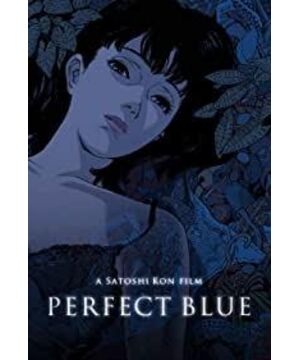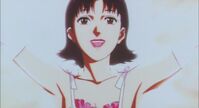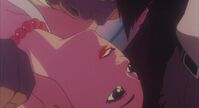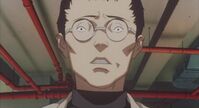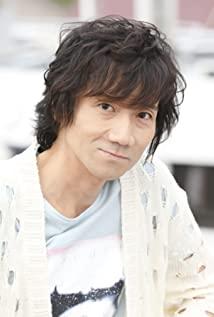PerfectBlue describes a girl idol group member Kirigoshi Mima, under the arrangement of the firm, Solo changed to act as an actor. Although this move contradicted Wei Ma's inner expectations (people want to be idols!), but in order not to cause trouble to others, she still bite the bullet and started the career of "I don't want to". After filming an almost real rape scene and the many strange murders around her, Wei Ma became more and more vulnerable, and gradually began to feel lost and wandering, and began to question who she was, and even had a problem with it. The phantom of the "other self". Between reality and reality, Wei Ma is walking towards the cliff step by step, and is about to fall into the abyss of no entry...
Page1. After watching the movie, I feel
different from many classic blockbusters that explore life and human nature. The emotional performance of people is in no way inferior to that of live-action performances, and because it is an animation, the hallucinations produced by the protagonist Wei Ma in his wanderings are not only unobtrusive, but also deeply felt by the audience. PerfectBlue's shots don't have a large range of defense. They don't go seriously enough to reflect on the whole society or the world. They only focus on telling the story, the characters in the story, and the psychological level of the characters inside, making the bloodiest narrative.
PerfectBlue said that the story is very clear, the plot is twisty but not complicated, the hints and explanations are just right, and it seems very powerful to teach people to get clueless without being tricky. But the emotional rendering power is strong, and after watching the whole movie, it really gives people a feeling of being overwhelmed by the heavy darkness. That's what I see as a pretty great movie, and PerfectBlue has the ability to pull you naturally into tight plots and "feel" in sync with the characters' dark and heavy struggles and struggles. fear.
Then they were swallowed together, and it was difficult to let go for a long time.
PerfectBlue is very successful in creating an atmosphere. The "sense of synchronization" between the audience and Weima's emotions is unbelievable. The first-person perspective makes you feel like you are "participating" in Weima's fearful experience, not just an audience. its environment".
I have to mention the key rape scene, Wei Ma shouted hoarsely, only the dazzling lights and the obscene eyes of a strange man were left in sight. The acting was real, and the rape scene was also real. Weima shouted "No", but she was still helplessly pressed to the ground, and she was still pressed to the ground by "self"'s determination. Helplessness and despair hit the hearts of the audience, and no matter how unbearable it is, the fact has already happened, and the strong smile after the event is even more sour. This section can be said to be a great example of psychological thrillers, but I Totally not brave enough to watch it again, and I think the same is true of Mima.
As far as the expression is concerned, in short, it is the real, the real, the real, the real, the real, the real, the fake and the real, the interlacing of fantasy and reality in PerfectBlue and the interlacing of dream and reality in "Dream Detective" have the same purpose. , is also director Jin Min's specialty. In the middle of the movie, Wei Ma's emotions almost collapsed. What are hallucinations, what are dreams, what are others, and what are you? The dark fear that even his own existence can't allow himself to identify with has grown into a huge chaos, is it acting now or is it in reality? Did I dream that I killed someone or did I actually kill someone? am I crazy?
"So I went to Harajuku..."
The layers of tense emotions were like walking on thin ice, and more and more false and real plots began to become chaotic, so chaotic that you suddenly woke up in the next place before you had time to think about the truth, so it was just a dream Or was it yesterday? The audience gets a lot of fun, but this kind of chaos is not a shortcoming of this film at all. On the contrary, such a way of expression makes you tightly bound in Wei Ma's emotions, as if you can fully appreciate what Wei Ma is in. Fear and unease, because the confusion and unease you feel when you watch a movie is also the chaotic and uneasy feeling that Mima feels.
As an in-depth film, PerfectBlue explores the so-called "self-lost". The confusion at the beginning gradually grew bigger and bigger. After filming the rape scene, after returning home to see the dead fish in the fish tank, she finally became strong. break the embankment. The real Wei Ma, the Wei Ma in the drama, the Wei Ma who hides behind the screen of "Weima's Room", and the Wei Ma who is wearing the idol-era singing costume constantly mocking herself, running out to fight one by one, Emotions on the verge of collapse made Mima begin to not know herself. Have you ever been to Harajuku, did you kill someone, and was yesterday really yesterday? Every scene of Wei Ma, who is wandering around, teaches people to watch heartbreak. Trapped in endless fear, like drowning in the middle of the Pacific Ocean, waking up every day in a scene where I don't know if it's a dream or reality, when I can't rely on myself, even the blood on my hands can't prove what is real.
As a thriller movie, portraying the concept of "human nature" is also the focus of this film, but as I said above, PerfectBlue is not ambitious to whine to all human beings, but an understatement from the transformation of fans, staff The expression on his face, the expression of the agent, etc. let the audience perceive it by themselves. Wei Ma has never blamed anyone around her or any kind of excessive behavior from beginning to end. She digested all the negative emotions by herself, and took on her own fears, but the bad atmosphere around her made her more vulnerable. This is human nature. Evil, leaving no trace. Director Jin Min did not specifically emphasize these parts, but it was impressive. The most deadly evil often hides in the dark, and hiding in the dark often becomes the deadliest evil.
Finally, as a classic movie, in addition to the fascinating storytelling method, PerfectBlue's wonderful plot arrangement has triple-jumped it from a great movie to a great "worth watching again". Movie. The degree of shock of the ending being revealed is difficult to assess. Although I was told by the spoiler before watching the movie who the murderer was, I was so shocked that I couldn't say a word at the end.
The logic of the characters in the play is difficult to detect, but there is a context to follow, such as posters torn off but appearing on the wall, mirror images showing the real situation, wigs that clearly distinguish the truth of staying in the United States, etc., are clear and not deliberate, not The vernacular can make the audience feel like an idiot, and it will not make people feel very irritable. When you understand everything and want to applaud the plot, it seems that you are suppressed by the huge heavy darkness layer by layer. The ending song of Good Risk is a lively and melodious song. Hurry up and use comfortable music to remind you that the world is still beautiful.
Overall, PerfectBlue takes advantage of the advantages of animated films to create special effects and atmospheres that cannot be achieved in real shooting. The painting style is simple, the tones are dark, and the mastery of many details is complete and natural. With superb plot arrangement and perfect emotional presentation, I would say:
"It is a profound thriller that makes people unforgettable and admirable, but cannot bear to watch it again because of the heavy psychological darkness."
Page 2. Pay attention to the details of the plot Said analysis
<1. Behind the behavior of staying in the United States>
The climax of the ending begins with the real figure in the mirror, and all the truth is revealed. The motivation for what the agent did in the United States was rooted in a wish that she could not achieve when she was young—she was also an idol, but she failed. Now, Weima, who is actively working hard, has become her hope. Rather than loving Weima, it should be said that she "takes Weima as herself". Weima's success and popularity are as if she has succeeded. However, this is only limited to cases where the reason to stay in the United States is still clear. At the scene of the rape scene, Liu Mei's burst of tears completely destroyed Liu Mei's last sanity towards Wei Ma, and awakened Liu Mei's "another personality" hidden deep in her heart, this personality "considered herself as Wei Ma".
Looking at it again, the whole movie is full of clever foreshadowing and hints. From the fact that Liumei set up a room exactly the same as Weima, and pretended to be Weima all the time, sending letters to crazy fans to write a diary, it can be seen that in fact Liumei's inner "Weima personality" has existed for some time, but In the United States, she has always been able to suppress herself with reason, and live in the society with the real personality of Liumei herself. Of course, it also includes, of course, interacting with the real Weima with the real identity of studying in the United States, and doing business. This is actually not so curious. You can think that the agent who stayed in the United States is also a super fan of Wei Ma. It is like we will collect many related products because of our love for One Piece, and we will imagine that we have eaten Devil Fruits and have very powerful ones. ability, and treats himself as Luffy's companion on adventures. But in a state of sanity and clarity, we will always be clear that the world of One Piece is a comic, and I live in a reality without domineering. She stayed in the United States, but suddenly couldn't tell the difference.
Another personality in the United States who "recognized himself as Weima" was awakened because of "grief and anger" that the beautiful idol Weima in his heart was completely destroyed. So the meaning of the existence of this personality became clear, "to get rid of all those who hinder the unmaiden idol", the screenwriter, photographer, director of the office, crazy fans, and the "fake" who did not sing and ran into a disgusting drama not numb".
<2. Why do Ugly fans die? >
Regarding how the crazy fans died, I think the key is that he tried to rape Wei Ma. Seeing Weima being abused seems like he was being abused, and it was the hand of the Weima personality (the crazy personality who regarded himself as Weima) who stayed in the United States after he ran wild.
After studying in the United States to enter the Weima personality and kill the director, he stayed in this personality until the end. She went to "Fake Weima", but witnessed the crazy fans who didn't kill well and wanted to rape others and "defiled themselves", so she got angry with the killer (he killed Weima directly, it might not be okay, madman see Maybe it will explode even more when he is killed...), and the real Mima was in a coma at that time, and it is judged that it was because of being frightened. Crazy Liumei disposes of the corpse, and starts to be serious after the scene is over. When Weima wakes up, Crazy Liumei uses the phrase "You are dreaming" to scare Weima, who is currently very fragile, and then takes her into the car. Take it slow at home. The evidence for this is that Liu Mei, who was in the car, said to Wei Ma, "Go back to Wei Ma's room", not "Go back to your room" (indicating that Liu Mei at that time did not agree that Wei Ma was true. not hemp).
As for the plot of Weima killing crazy fans, my argument is that Weima's memory is correct only to the place where she was thrown to the ground and her clothes were torn. In order to protect herself, the fake memory in her head was, to put it bluntly, Wei Ma's brain supplement. In fact, she had already fainted at that time. The proof is that being hit by a blunt object on the temple is a one-hit kill, how can there be no blood left on the ground?
<3. After the end... Wei Ma's psychological discussion>
Judging from the results, after the key rape scene, Wei Ma was surrounded by fans and chaos, and after crying a lot, she still gritted her teeth and held on; After so many things happened, I broke down several times, but still stood up bravely. In the end, the hard-working film and drama were very popular and reached a new peak in his acting career. Weima showed a confident smile in the mirror at the end of the film, "I really do!". How reassuring, but isn't this another implicit collapse?
Don't forget that Mima came to Tokyo away from home to sing!
At that time, Rumi regarded herself as Mima and sent it to crazy fans Is it possible that the "that's not me" written in the letter is still what the "real Mima" wants to tell fans even now?
Wei Ma emphasized "I'm already an actor" with the hallucination Wei Ma more than once, but the hallucination Wei Ma has never agreed to it once. Isn't that hallucination Wei Ma the product of Wei Ma's own inner restlessness? Now, where did this elusive "Idol Mima" go? Did you disappear after entering the hospital in the United States? Or, in the depths of Wei Ma's heart, did he find a place to live secretly?
After these events, did Weima learn to grow up, or did she learn to suppress painlessly?
============
Blue Fear PerfectBlue is the first time I have come across such a shocking thriller "animation".
Briefly describe the plot:
Wei Ma, who was originally an idol star, decided to transform into an actor in order to break through and have more development on the star road.
And in order to be taken seriously on the screen, he boldly performed rape scenes.
Originally thought that there will be more and more scenes in the future, and Xingtu should be smooth.
I did not expect the pressure from fans from the outside world, the pressure exerted by the agency and the agent, the warmth and reality of the people on the set, and more importantly, the difficulties in Wei Ma’s heart. ,
everything began to make Wei Ma have hallucinations, and the original self who was an idol began to appear in front of him, showing an evil smile to mock the current Wei Ma.
The plot can attract a lot of people who pick up the film, and
gather all the popular spicy flavors: rape, nudity, murder, mental illness... .
But the good-looking movie is not only because of these heavy taste settings (of course it is also part of the reason)
Director Jin Min has assigned appropriate roles in the characterization of human nature, and each role uses his own ideas to express his views on Wei Ma's transformation .
Although the overall story is interpreted from the perspective of Wei Ma, because of the appearance of various character settings, the story will not be biased and thin.
In addition, the director's movement of the mirror is very changeable, the real and the fake are real, which makes people nervous.
The whole film makes people think about who the murderer is, who killed those people, whether Wei Ma has schizophrenia... etc. The question
is just one second after you determine the answer, and the next second it subtly lets you Suspicion
The whole film didn't reveal the murderer until the end (and it was a character that I didn't suspect at all ==)
The suspenseful and tense atmosphere went all the way to the end, it was super cool to watch, and the stamina was very strong (I was always in the bedroom worrying about being chased and killed me Schizophrenia)
[Character Description]
The great thing about this film is that although the story is told from the first perspective (Weima's perspective),
the world in Weima's eyes that will not stay forever,
we can still observe and recognize other characters idea.
For example, Mr. Stalker is an itchy character (I think it's him in the whole film!)
In addition to the character's appearance... um.... scary, it also shows an ecology in the show business - crazy fans crazy behavior.
We can see the depth of the characters here - some people who originally claimed to be fans, sighed in a mocking tone for Weima's shooting of rape scenes, nude photos, etc.
, while still looking at Weima's body;
As for Mr. Stalker, Weima, who is full of idolatrous worship, should have been a loyal fan and loved him, but his madness is also outrageous.
Comparing the two shows human nature, and "Blue Fear" has always pointed out the horror and darkness of human nature.
[Fictitious and Reality Editing] I
have always had a soft spot for this kind of film that intersects reality and reality, although "Blue Fear" is already an old film
, and I think it is sometimes a little old-fashioned in terms of scene transitions (such as after a close-up profile). Sliding to the back of the protagonist's head and then the scene changes)
but it seems that Mima keeps repeating the wake up in bed, and every time I wake up, I find that the surrounding is different from what I remember, I like it very much! Because I've been scared haha!
There is also the appearance of idol characters like Weima, and the atmosphere of suspense and horror is really great.
Is the person I want to be the real me? The whole film was buried by this question
, and I was also driven by the evil (I really can't think of a better adjective) smile of the idol. Play the escape play inside.
The whole film has real people chasing and killing scenes, as well as imaginary characters chasing battles. The real and the fake are intertwined.
Which picture and which memory are true? It's nice to have no answer.
The writing ability is not as good as how to tell the reasons why I like this film in detail.
Maybe the painting style is not so novel and beautiful, but both the storyboard and the plot are very classic. I will not feel that it has passed the generation.
My classmates also recommended Jin Min's other new animated films like "Millennium Actress", "Dream Detective", etc. I am looking forward to watching it!
In addition, I will attach the comments I read about "Blue Fear" on the Internet:
the most classic and the most representative of Jin Min's unique vision should be his debut work "Blue Fear", which was
unveiled with Japan's unique idol culture. The duality of good and evil caused by the ugliness of human nature and the repressed human heart, the
disturbing plot arrangement and the surreal style of painting create a quirky unease rarely seen in animated films,
and this film is almost unchanged by Daeron. Darren Aronofsky in "Black Swan". ======= The scariest animated movie I've ever seen in my life is probably PerfectBlue
. The Golden Horse Film Festival once played a series of KonSatoshi's works in memory of the passing of KonSatoshi, giving me the opportunity to enjoy all of KonSatoshi's films on the big screen again after the Millennium Actress. When I watched Millennium Actress for the first time, I was only a high school student. Although I was fascinated by the ending, I couldn't deeply understand the exquisite craftsmanship and inner meaning of its mise-en-scène. As a young girl, I just felt that the scene was gorgeous and I didn't know the taste. As he grows older, although he is still a young man who is still studying, he seems to see a little more.
I still remember watching Jin Min's debut novel PerfectBlue alone in the middle of the night, and then I had a lingering feeling in my heart, and all my perceptions seemed to be at the mercy of the director. Such similar feelings only reappeared when I admired Black Swan (Black Swan) and surrounded me. The two films have similarities. Darren Aronofsky, the director of "Black Swan", did not shy about his love for "The Blue Fear" and bought the film copyright. But in terms of plot setting, the overall tone of "Blue Fear" is darker and gloomier than "Black Swan". Compared with the heroine's fascination with the stage and the loss of herself and the role of Swan Lake in the film "Black", "Blue Fear" is not only a confusion of self-value positioning, but also implies the performer's (being) The packaged appearance is the same as the truth.
In the opening scene, the use of editing to compare the two lives of Wei Ma is very exciting. The comparison between the energetic idol Wei Ma on the stage and the ordinary Wei Ma who lives an ordinary life is clear at a glance. To the audience off stage, Wei Ma, who is singing and dancing on the stage, is just a beautiful image deliberately packaged by the company, but to Wei Ma, why is the idol Wei Ma not one of the aspects of self? Wei Ma's confusion about self-idol/actor positioning is like the blurring of actor's profession between reality and reality. Actors (actors) always shed their own tears in other people's stories.
In the movie, Wei Ma felt the unease of being watched by others many times in life, but in fact, whether as an idol star or an actor, he is a role that is "watched" in society. Whether it's the idol Weima who performed in front of the audience at the beginning, the actor Weima who performed a rape scene in front of the public, or the photo actress Weima who took a sexy photo, they are all under the "male gaze" (malegaze), they are all affected by power. the manipulating party. In the rape scene, the actor Weima is at the mercy of the plot and the decision of the staff, and becomes the object of lust by men, but the idol Weima is not at the mercy of the company, the object of lust for the fans, the difference is only external Just in the sweet icing of the packaging. The part of the photo shoot is even more interesting. The subtlety of photography lies in the fact that the person who truly has the power to decide the viewer's perspective is not in front of the lens, but the photographer behind the lens. The existence of the camera itself shows that the subject is photographed. The power level between the photographer and the photographer, Wei Ma, who is under the sexy photo, is shaped by the camera as the object of male desire projection.
Sex scenes, sex scenes, career lines, and the desire to spy on other people's bodies have been integrated into the entertainment industry, and consuming female/male bodies has long been the industry's most intimate marketing method for animal instincts. Leaving aside the plot of the serial murders, "Blue Fear" shows the dark side of the entertainment industry that everyone knows but no one dares to talk about.
The fly in the ointment is that the ending is inevitably awkward and a little weak. Besides, I don't know whether it is due to the limited budget or the age. The production specifications of "Blue Fear" belong to the TV specifications, which reduces the quality a little, but despite this, it is still not reduced. The style of Jin Min's works. As the debut work, "Blue Fear" not only took a different route from Miyazaki's family-friendly viewing, but also showed what animated films can do, depicting the dark and ugly reality of society.
===========
"Blue Fear" is a work directed by the late Japanese animation master Toshitsu Ima. The story narrates that a girl named Mika Kirigoshi decided to leave the idol group and turn to the career of an actor. However, in addition to the hardships of the process (in order to increase the role, the rape scene was performed on the screen), but also to face the inner unease and the external enemy: a man who hides the mirror manipulates the thread to force her step by step. On a dead end, she was asked to pay the price of "disappointing" fans. As the plot progresses, the audience begins to wonder if there really is a "real murderer", or is everything just an "illusion" in Wei Ma's mind?
The film was released in 1998. In the same year, I bought this film and "Memories" at Guanghua Mall. I still remember when I watched it ignorantly and was startled by the agent who wore Wei Ma's performance costume, leaving an indelible impression. (On the contrary, I don't remember the deceased who were brutally killed in the process.) A while ago, Xiao Shi accompanied me to reminisce, but she guessed the murderer early in the morning, and she still had a "Is this difficult?" expression on her face. Well, it seems that my brain really has not been very smart.
In addition to the suspenseful and terrifying atmosphere, the most surprising thing about "Blue Fear" is its psychological description. Through the continuous repetition of the narrative and the mixed presentation inside and outside the play, the audience gradually fell into Jin Min's trap, and began to be chaotic and insoluble like Wei Ma, and the boundary between fantasy and reality began to collapse. (The same situation also appeared in Jin Min's posthumous work "Dream Detective", the picture is more gorgeous, but the atmosphere is better than this film) Although the final apparent ending is "everything is done by the agent. ”, but it is undeniable that her world would not be trapped in thick fog if there was no confusion in the process. So "Blue Fear" is not just about the agent's fascination with the horrors of the past, but also about Weima's fear of the future. In a way, if she never hesitated, maybe nothing would happen. The jungle beasts in the outside world are caused by their own confusion, and this is also the state of mind that many people have experienced: at the fork in life, on one side is the sea and sky with no wind and no waves, and on the other side is withered vines and old trees and crows. scene. After embarking on that road inaccessible, we are fascinated by emotions and desires; but as long as we can go through these torments that drive people to a desperate situation, the road of life will suddenly become clear, and the darkness will die in the sun. And fear, dormant in our hearts, becomes our ally and advantage.
Aside from the dizzying nightmarish repetition of the narrative, the most astonishing sequence is the one where the agent goes after Wei Ma. "How could it be possible to jump lightly on a telephone pole?" It was impossible, but Mima used her fear to help her manager get wings. Look at the agent in the mirror, panting and ugly. But in Wei Ma's eyes, she is like a fairy. This is her nostalgia for the past and her fear for the present. She summoned monsters to test and kill herself, forcing herself to grow and thrive. In the end, Wei Ma successfully became a big star, and the manager was trapped in a mental hospital with no future. From a symbolic point of view, Weima successfully repelled his inner demons and made a smooth progress towards the road to a powerful actress. Why not give the villain to death like Hollywood does? Because that is not evil, but yin. Only by facing your yin can you know that you are standing in the yang. Only by admitting that there is still darkness in your heart can the light shine brighter. This is the demonic nature of human beings, and it is also the divine nature of human beings.
==========
Content Introduction
The late animation master Jin Min's old work "Blue Fear" (パーフェクトブルー/PerfectBlue), encountered the Great Hanshin Earthquake when preparing for the production, and therefore reduced the budget and could only go the OVA route (only videotape specifications were sold). Although the cost is not high, the creativity that comes out is quite good.
The film tells the story of Miyoshi Miyuki, who went solo from the idol group "CHAM!". With the help of her agent, she transformed into an actress and worked hard to move towards movies and TV dramas. However, the outside world only regards her as a vase-style actor. In order to prove her acting potential, Wuyue Mima is willing to accept the bold-scale plots written by the screenwriter. For example, she is willing to cooperate with super-modern plots such as nudity and rape. At this moment, Wuyue Weima noticed that a crazy fan was following her. There was also her exclusive official website on the Internet that recorded her words and deeds every day. Wuyue Weima slowly felt as if there was another her in this world. , actually can completely control her world. Is it schizophrenia or crazy fans? Mikazuki Wuxue found out that the truth was beyond imagination.
"Blue Fear" can be regarded as a great thriller that discusses split personality or pierces idolism. The film's foreign film critics described this film as "When Disney meets Hitchcock", which seems to be quite accurate, because The reasoning and thriller atmosphere of the whole film is well done. When you think that the truth is like that, the ending turns around, and there is a final reversal ending. Although this story was 13 years ago, it still seems to be full of tension and not outdated at all. Comparing with the major reversal endings such as "The Sixth Sense of Spirituality" or "The Sixth Sense of Ghosts and Ghosts", in fact, "Blue Fear" was completed earlier than these two films, which shows the sharp foresight of Jin Min's creation.
Audio-visual performance
In fact, in Jin Min's works, the effect of blu-raying is not like the restoration level of Disney's diamond series. Taking the restoration cost into consideration, it is not difficult to find why Jin Min's animation works have been digitally restored, but the overall brightness and contrast are still inferior to Blu-ray works such as "Beauty and the Beast".
The image and sound source of "Blue Fear" are not too prominent. Although the HD effect is much better than the SD image quality, the overall sharpness of the lines is acceptable, the color contrast is also good, and the image quality has soft film. I feel that this should be related to the fact that the paintings were printed on the negative and then washed and scanned into the computer for restoration. Jin Min's other old Blu-ray work "Inception" actually has the same problem. Although the color of the picture is full, there is always a thin layer of fog on the image.
Sound effects: Japanese DolbyTrueHD5.1 and DTS-HDMasterAudio5.1 are two options. The author listened to DolbyTrueHD5.1. The sounds with more scary effects really scared me. The effect of re-creating the spatial sound field is not bad. . In fact, I would have watched this film because of the release of the Oscar-winning film "Black Swan", because Darren Anovsky, the director of "Black Swan", bought "Blue Fear" after watching "Blue Fear"
.
The copyright of the film is such that Darren's "Nightmare Elegy" has similar camera positions compared to this film, and many camera positions in "Black Swan" are also from the design of "Blue Fear". In order to launch the Blu-ray of this film, the behind-the-scenes part of the film also re-recorded several PerfectBlue lectures in 2008. This part was lectured by Jin Min, who was not dead at the time, and analyzed the reasons for his shooting and editing techniques.
For movie fans, this scene is very precious, and through his explanation one by one, it is actually more interesting than many director's comments. This whole paragraph is like a teacher in a class at school, and the beautiful host who is cooperating with the questions is a bit like a vase, and does not do enough homework for the movie. But I want to find this vase to fight. It is really to make the picture look better, but it also makes Jin Min feel a little embarrassed when explaining some of the more naked pictures in the film. For example, there is a vertical movement of the camera in the studio that actually represents the important parts of men , but the hostess didn't seem to understand this sexually suggestive plot, which made Jin Min embarrassed to say it, and it would be embarrassing to explain more... The other special recordings are the ones made before, which are SD normal image quality. You can compare the difference between the original version and the restored version.
=========
If you like the feeling of traveling between fantasy and reality in "Millennium Actress", or the interpretation of fantasy and reality, true self and self in "Inception Detective", then you will definitely like "PerfectBlue" (Chinese translation: " The Room of Wei Ma" or "The Fear of Blue")
PerfectBlue is Jin Min's work in 2008, and it is also the famous work that he started to make internationally, but it is an animated film that is relatively unfamiliar to the general audience.
Perhaps it is because the medium of expression is "animation" that Jin Min was able to perform this film so amazingly. In terms of pictures and music, "PerfectBlue" is incomparable with his later "Millennium Actress" or "Inception"; in terms of "warmth" or "audience suitable for the group", "PerfectBlue" is even more gorgeous. Not as good as "The Godfather of Tokyo" for the whole family to watch. Because "PerfectBlue" is not only full of female three-point shots, but also full of corpses and blood.
PerfectBlue is a thriller.
The female artist Miyoshi Kirigoshi, who decided to transform from an "idol singer" to a "professional actor", received a series of intimidation and threats after she announced her withdrawal from the girl group. In addition, Wei Ma's every move was put on a website called "Weima's Room" by an unknown admirer. What's more, the playwrights, directors, and entertainment company owners related to her have all suffered to torture.
The wonderful thing about the plot is that the crazy fans who keep appearing from beginning to end have long been convicted by the audience as "murderers", but the plot is full of Weima's fantasy and real life, implying that "Weima himself" is the real murderer. It was not until the crazy fans resorted to lynching and attempted to "punish" the "actor Weima" who betrayed "Idol singer Weima", and after the camera was pulled back to "Weima's room", everyone discovered that the real culprit was someone else.
Of course, we have seen this kind of plot in Hollywood movies for a long time. If the movie is just this kind of plot, it is not uncommon enough. Viewers who have watched "Ghost in the Shell Innocence" released by Mamoru Oshii must have a deep understanding of the narrative method of Degussa repeating the same experience several times in the mansion of an old hacker, but it was used earlier in "PerfectBlue" A similar technique was used to express the mentally tortured Wei Ma.
Taking advantage of the unique shuttle and convenience of animation, Wei Ma repeats his life several times, but each time it ends, it is slightly different. The unsatisfactory career and the spiritual oppression of the strange website make the pictures "repeat" these times. The weird atmosphere makes it even more difficult to figure out which part is Weima's real life; which part is the character in Weima's series; which one is Weima's phantom come true. .
We see a more mature, more gorgeous and more romantic interpretation of this way of expressing life in the play in "Millennium Actress" created by Jin Min a year later. And the wrestling world between the real self and the imaginary personality is also conveyed in a more dreamy and larger image in "Inception Detective" in 2008. Since I watched "Millennium Actress" and "Inception Detective" first, I think the "ideas" in these two films seem to be separated from "Perfect Blue" and presented independently in a more complete and mature way. In contrast, "PerfectBlue"'s shuttle between the real and the unreal seems a little simple and immature. Especially in the movie with the lines and script of the Criminal Minds series all the time, the feeling of a certain narration "explanation" seems to be a little heavy. Of course, that doesn't detract from the virtues of PerfectBlue.
After Wei Ma transformed into a professional actor, it was not as smooth as the office owner imagined. Because she was an "idol" at the beginning—a beautiful woman in the palm of a man's imagination, a symbol of innocence and purity—Mima's transformation process was even more difficult. She was going to act in a rape scene, and her whole body would be touched by different men in front of the camera. She was going to take a photo album, lying in the studio with all three o'clock exposed, and being inspected by a high-end telescopic lens and a male photographer who kept sweating. Even the two comrades who formed the group in the past privately believed that she had already had an affair with "that group of people".
The beauty of PerfectBlue is that it compares the real world with animation. Before Wei Ma's transformation, she said to her mother in her hometown, "Aiya! You don't understand what's going on in this circle." In fact, she herself couldn't understand the darkness in "this circle". Popular playwrights increase the number of dramas by peeping at the body of the "female idol"; well-known photographers are just carrying expensive lenses and pretending to be a body photo, but they are in fact the rotten shit that eats the tofu of female artists; The character, the little-known actor who is in the role, apologized for the "offense of obligation" and Mima while the director was calling the card.
The most uncomfortable thing in the movie is not the corpses that were tortured and killed, but the rape scene and the nude photo shoot in Wei Ma. Through the studio, the audience can see the rape process by using the film's lens. The only thing that can be contained in Wei Ma's eyes, who are pressed by a group of men under the body in the lens, is the crystal lamp that keeps flashing above the stage. Laxatively, he monotonously shouted the prescribed lines "No, no". If there are only these rape scenes, to be honest, "PerfectBlue" can't even qualify as a tutor. What makes it really uncomfortable to watch is the director, producer and playwright who scrutinize the body in the studio and watch it with gusto. As well as the angry tears of the agent who stayed in the United States.
The rape scene was finished, and when the nude photo shoot started, there was no manager to speak for Wei Ma, and even friends from the idol group in the past looked at this matter in a cool tone of watching the drama. There was no photographer's face, just the sound of drums and shutters as he asked Wei Ma to undress, and his face soaked with sweat from his high sex drive. When the nude photo collection was published in the magazine, the fans who regretted Weima's transformation into an actress and worried that she would no longer sing at the beginning of the movie also browsed and commented on her nude photos in the small bookstore in a way that didn't matter to them. Everything turns terribly fast and terribly cold, and it's the second uncomfortable part of the movie.
The protagonist Wei Ma seems to be aggrieved, swallowed up, and weak, but at the end of the movie, she is an actress who has a successful career and is still low-key and star-studded. "It's all a last resort" that she cried and shouted in the room by herself showed the ambitions and desires that she didn't even know under her simple appearance. Can Mima really not know which one is her? When faced with career pressure and mental coercion, she may not be able to tell the difference, but once she recognizes the big dye vat of the entertainment industry and what she wants, a Wuyue who dares to take off, dare to do, and doesn't care about everything, will become numb. born!
Although the agent Liumei is a murderer of split personality, all she wants to protect under her crazy behavior is the "idol singer Mima" who she once hoped to grow up simply. The former is a sober fall, and the latter is a chaotic fall. In fact, both of them are divided, but Wei Ma divides the past self in the way of abandonment; while Liu Mei divides the "grown up Wei Ma" in her mouth and the fact that she is unwilling to face it in a destructive way. .
"Isn't it our job to protect artists?", "Is this really what I want?", "Have you made up your mind?", "All this is a last resort, not what I really want to do", Too many dialogues in the movie are applicable to all kinds of life in reality. Isn't the common fault of human beings trying to climb up, or to voluntarily "sacrifice" some part of oneself--maybe mind, body, emotion, or external things--to achieve some goal? It's just that in the movie, Jin Min uses the colorful showbiz! A big dye vat that the public wants to peep at, have the chance to even take part in; a bloody stage that looks more sound and light, and a bloody stage that is more real and persuasive.
View more about Perfect Blue reviews


